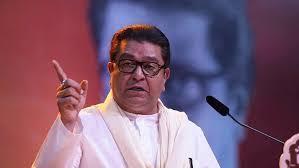
Only Marathi & English be taught in schools: Raj Thackeray to govt
In a bold move, Maharashtra Navnirman Sena (MNS) chief Raj Thackeray has written to the state government demanding a written order that only two languages – Marathi and English – be taught from Class 1 onwards in state board schools. The government had declared this earlier, but didn’t issue a written order, which has prompted Thackeray to threaten agitation if the decision is rolled back.
The news has sent shockwaves across the education sector, with many experts and parents weighing in on the implications of such a move. Proponents argue that it will help preserve the cultural heritage of the state by promoting the use of Marathi, while opponents claim it will limit students’ exposure to other languages and global opportunities.
The controversy began when the state government announced its decision to make Marathi and English the only languages taught in state board schools from Class 1 onwards. However, the government failed to issue a written order, which has left many wondering whether the decision was merely a statement or a binding policy.
Thackeray, known for his fiery rhetoric and willingness to take bold stances, has now written to the government demanding a written order to implement the policy. He has warned that if the government fails to comply, the MNS will launch a mass agitation to ensure that the decision is implemented.
The MNS chief has argued that the decision is necessary to preserve the cultural identity of the state and promote the use of Marathi, which has been facing a decline in popularity among younger generations. He has also claimed that the decision will help reduce the burden of language learning on students and make education more accessible.
However, many experts have raised concerns about the implications of such a move. They argue that limiting the number of languages taught in schools will restrict students’ ability to communicate with others and limit their access to global opportunities. They also point out that the decision may disproportionately affect students from non-Marathi speaking communities, who may struggle to learn the language.
Furthermore, some experts have questioned the feasibility of the plan, given the existing language curriculum in schools. They argue that the decision may require significant changes to the curriculum and teacher training, which may not be possible in the short term.
Parents, too, have mixed reactions to the decision. Some have welcomed the move, arguing that it will help their children develop a stronger connection to their cultural heritage. Others have expressed concerns about the limited access to other languages and global opportunities that their children may face.
The debate has also raised questions about the role of language in education and the impact of language policies on students. Some argue that language is a critical component of education, as it enables students to communicate effectively and access information. Others argue that language is merely a tool and that the focus should be on developing critical thinking and problem-solving skills.
In conclusion, the controversy surrounding the decision to limit the number of languages taught in state board schools has sparked a heated debate about the role of language in education and the impact of language policies on students. While proponents argue that the decision will help preserve the cultural heritage of the state, opponents claim that it will limit students’ exposure to other languages and global opportunities. As the debate continues, one thing is clear: the decision has significant implications for the education sector and will require careful consideration and planning to ensure that it is implemented effectively.
Source: https://x.com/RajThackeray/status/1930208483518857496






